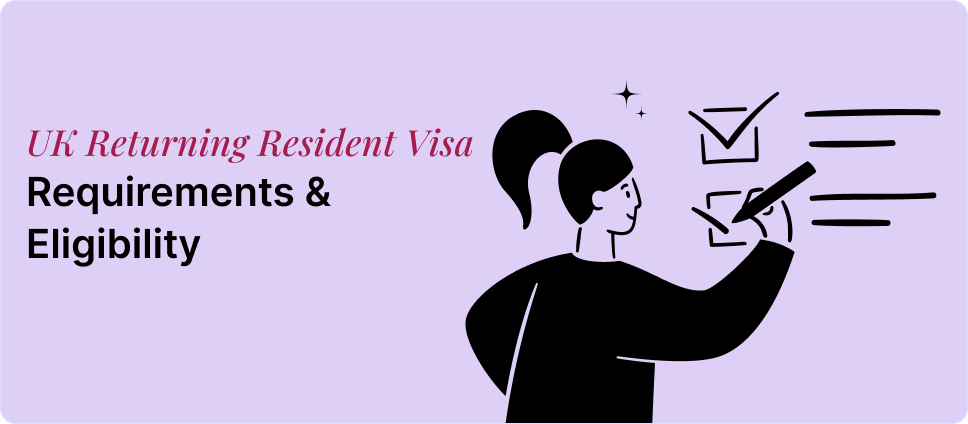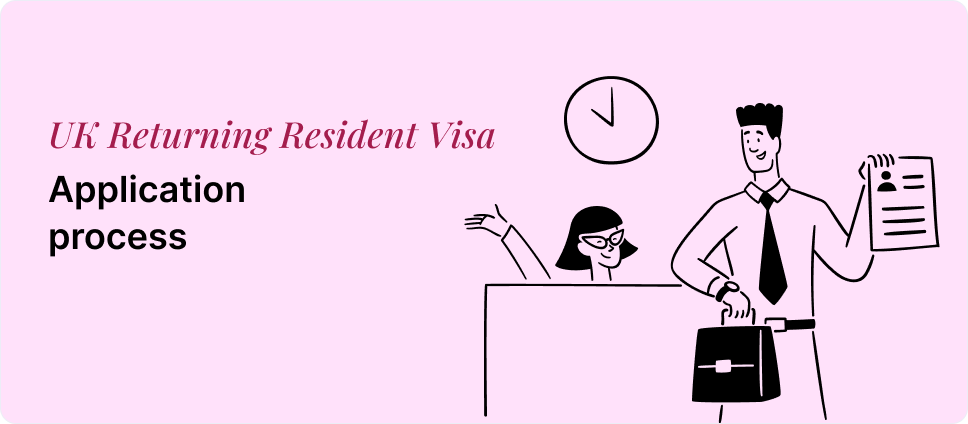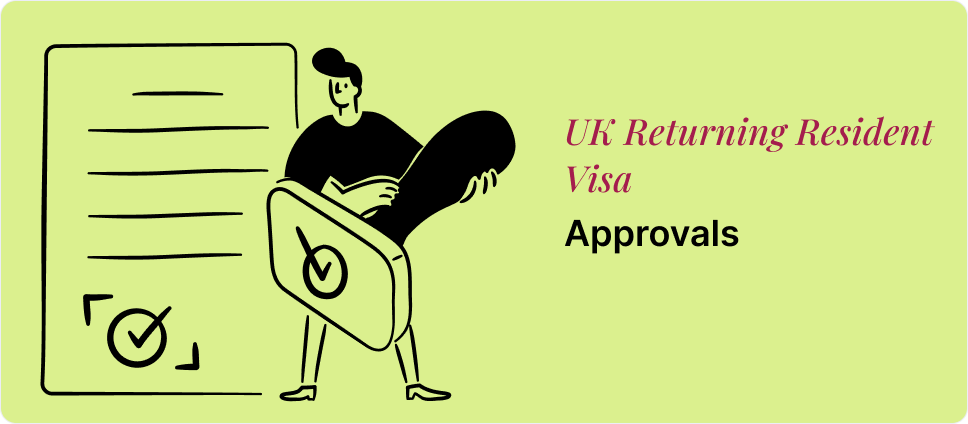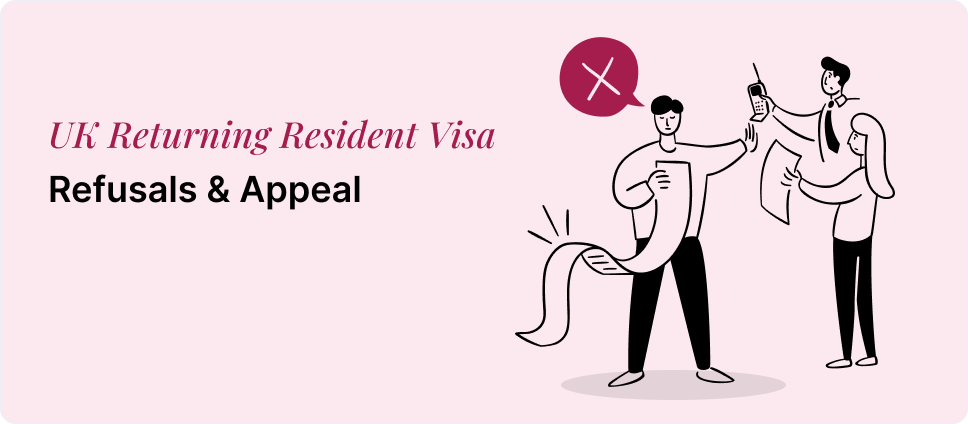Key Takeaways
The Returning Resident Visa is for individuals who previously held Indefinite Leave to Remain (ILR) in the UK but lost it after being absent for more than two years. It allows you to regain ILR status upon demonstrating solid ties to the UK.
Applicants must apply from outside the UK, pay a fee of £637, and provide biometrics. You must also submit documents proving strong UK ties in the past, present and future, such as family connections, property ownership, or business interests.
The application typically takes around 3 weeks to process. Approved applicants receive a visa valid for 90 days to enter the UK and must then collect a Biometric Residence Permit (BRP) to confirm your ILR status. In future from 2025 onwards, this may be replaced but the e-Visa digital status.
Specific individuals, like British Armed Forces members or Commonwealth Office employees overseas, may be exempt from losing ILR status due to extended absences. The Home Office also considers exceptional personal circumstances, such as health issues, when assessing applications.
Services
Expert Assistance for UK Returning Resident Visa
UK Returning Resident Visa Consultation
Get personalised visa guidance tailored to your unique circumstances.
UK Returning Resident Visa Applications
Maximise the chance of a successful outcome with expert help to prepare and submitting your UK Returning Resident Visa application.
Appeal UK Returning Resident Visa Refusal
We assist with appeals and reviews to give your UK Returning Resident Visa application the best chance of success after a refusal.
Table of contents
What is the Returning Resident Visa?
The Returning Resident Visa is for individuals who previously held Indefinite Leave to Remain (ILR) in the UK but lost this status after an extended absence. If you have been away for less than 2 years, you retain your ILR and can re-enter the UK without this visa, provided you had ILR when you last left and did not receive financial support from the Home Office to leave. Upon re-entry, you should present the stamp, vignette, or biometric residence permit that initially permitted you to settle in the UK.
The Returning Resident Visa enables you to apply to retain or regain your ILR status. Typically, ILR status may be lost if:
- You have been outside the UK, the Channel Islands, and the Isle of Man for more than 5 continuous years (if you have settled status under the EU Settlement Scheme, except Swiss citizens and their family members).
- Swiss citizens and their family members with settled status under the EU Settlement Scheme lose ILR after 4 continuous years of absence.
- ILR may be revoked after 2 continuous years of absence for all other individuals.
Those absent for less than these periods can re-enter the UK without applying for a Returning Resident Visa.
Requirements & Eligibility Criteria

To apply for a Returning Resident Visa, you must demonstrate that you have maintained strong ties to the UK during your time abroad. These ties can include family connections, property ownership, or business interests and are crucial in the application process. The UK Home Office will assess the nature and strength of these connections to determine eligibility.
To apply for a Returning Resident Visa, applicants must be outside the UK at the time of application. You are required to pay any applicable fees, provide the necessary biometrics, and submit a passport or other travel document that verifies your identity and nationality.
Entry Requirements
- Previous Settlement: Applicants must have previously been granted settlement (ILR) in the UK, which is at risk of being cancelled or revoked due to continuous absence from the UK for over 2 or 5 years.
- Entry Clearance: Before arriving in the UK, applicants must apply for and obtain entry clearance as a Returning Resident.
- Documenting Reasons for Absence: Provide evidence for the reason(s) for your absence from the UK, such as health treatment overseas, caring for family members, employment purposes, or studying abroad.
Intention to Settle
Applicants must prove a genuine intention to return to maintain permanent residence in the UK for settlement purposes. This is evaluated based on evidence such as strong UK ties, which could include:
- Personal or Social Ties: Having close family, relatives, friends or close associations with institutions in the UK.
- Asset Ownership: Owning or renting property or other assets in the UK.
- Business or Employment Interests: Maintaining work activities, business operations or investments in the UK.
- Financial Activities: Providing utility bills, bank statements, or other financial records showing ongoing activities and commitments in the UK.
Special Considerations
- Public Funds: Applicants must not have received public funds to leave the UK, except for cases under the Windrush Scheme.
- Dependents: Partners and children must apply separately if they also wish to return as Returning Residents.
- Parental Consent: Written consent from parents or legal guardians is required for applicants under 18 for the visa application, living and care arrangements, and travel to the UK.
Exemptions and Special Circumstances
The Home Office may consider exceptional personal circumstances, like health issues or family emergencies when deciding on ILR status, even if they've been outside the UK for over the relevant 2 or 5 years. These include:
- Members of the British Armed Forces and their Dependents: If you or your family members serve in the British armed forces, you can maintain your ILR status despite extended absences from the UK.
- British Council, Foreign Office, or Home Office overseas and Dependents: Individuals working along with their families are exempt from losing their ILR status due to overseas service.
- UK Passport Holders Before 1973: Those who hold a passport issued in the UK and Islands before 1 January 1973 are also exempt from needing a Returning Resident Visa, provided their absence is related to specific duties abroad.
- Employees of Commonwealth Offices Overseas: If you work for a Commonwealth Office overseas, your ILR status remains intact after two years of being away from the UK.
The Home Office may also consider exceptional personal circumstances, like health issues, natural disasters, COVID-19 pandemic or family emergencies when deciding on ILR status. In 2023, new rules were introduced, allowing people who have lost their ILR to apply for settlement again, even if they returned to the UK as visitors.
For anyone applying to enter the UK under the Windrush Scheme, there are exemptions from the fees typically required for a Returning Resident Visa.
Required Documentation

When applying for a Returning Resident Visa, you need to provide the following documents:
- Current Passport: A valid passport or other travel identification.
- Previous Passports: Any previous passports you have held.
- Photograph: A recent passport-sized colour photo.
You must also include documents that explain the reasons for your absence from the UK and evidence of your strong ties to the country, such as:
- Family Details: Information about immediate family members or dependents residing in the UK.
- Marital Status: Marriage certificates or relevant documents.
- Property Evidence: Documents proving ownership of any properties in the UK.
- Employment or Education Proof: Letters from employers or educational institutions confirming your work or studies.
- Business or Work Documentation: Details of any business or commercial activities you are involved in within the UK.
- Financial or Residence Documents: Utility bills, council tax statements, or similar financial or residence records.
- Medical Documents: A statement from a medical professional stating whether your extended absence was due to health reasons.
Processing Times
The typical processing time for a Returning Resident Visa is around 3 weeks after submitting your application and re-enrolling your biometric information at an overseas Visa Application Centre (VAC).
Application Fees
The application fee for a Returning Resident Visa is £637 per applicant.
How to Apply for the Returning Resident Visa

How to Apply for the Returning Resident Visa
Applications are made online directly via the UK Visas and Immigration website. Select the appropriate visa category and initiate the process by creating an account or logging in if you already have one.
Select Biometrics Country
Choose the country where you will provide your fingerprints and photo for biometric requirements.
Application
Complete the online application form (Form RR). Provide accurate personal information, travel history, and details about your current residency status. Ensure that all information matches your official documents to avoid delays.
Documents
Upload copies of required documents, including your current and any old passports, proof of ties to the UK (such as mortgage statements, utility bills, or tenancy agreements), and any additional documents relevant to your circumstances, such medical certificates or proof involuntary extension to your trip.
Declaration
Thoroughly review your application to ensure all information and documents are accurate and complete. Agree to the declaration statements as required.
Pay the Fee
Pay the visa application fee of £637.
Visa Application Centre
Schedule an appointment at an overseas visa application centre to re-enrol your biometric information, including a fingerprint scan and a digital photo.
Approved Application

If your application for a Returning Resident Visa is approved, you will receive Indefinite Leave to Enter the UK. This will be granted through a visa valid for 90 days, during which time you must enter the UK. Once you arrive, you can collect your Biometric Residence Permit (BRP) from your chosen Post Office. The BRP will confirm your right to live permanently in the UK and reinstate your previous Indefinite Leave to Remain (ILR) status as if it had never expired. From 2025, the BRP will be replaced with the new e-Visa digital status.
Refused Application

If your application for a Returning Resident Visa is refused, you have no right to appeal the decision. However, you may be able to challenge the decision through an Administrative Review if you believe it was incorrect due to one or more case-working errors by the Home Office. It is important to note that new evidence is not normally accepted as part of this process. Therefore, it would be worth seeking legal advice on whether submitting a fresh and stronger application with more comprehensive documents would be a more worthwhile option.
Administrative Review Process
- Review the Decision: Carefully assess the Home Office refusal letter for any factual errors or overlooked information, as these could be grounds for requesting a review.
- Apply for Review: If you are outside the UK and applied from outside the UK, you must apply for an Administrative Review within 28 days of receiving the decision.
- Pay the Fee: The review costs £80, which will be refunded if the initial decision is overturned.
- Await the Outcome: The Home Office's decision on the Administrative Review can take up to 6 months.
Common Reasons for Refusal
Applications for a Returning Resident Visa can only be accepted if you demonstrate a genuine intention to return to the UK for settlement or show that you have always kept strong ties to the UK, such as family, property, or business connections. Other common reasons include:
- Receiving Public Funds: If you received public funds to leave the UK, this could negatively impact your application.
- Lack of Evidence for Compassionate Circumstances: Failure to provide adequate evidence for any compelling circumstances that justify your absence and your intention to return can also lead to refusal.
- Inability to Prove Strong UK Ties: Your application may be denied unless you convincingly demonstrate strong ties to the UK, such as family relationships, asset ownership, education, professional or social interests.
Maintaining ILR Status
To prevent your Indefinite Leave to Remain (ILR) status from lapsing, it's important to demonstrate a genuine intention to settle in the UK by maintaining strong ties to the country. This could include:
1. Regularly Return to the UK: Stay in the UK at least once every 2 years with the intention of settling. Brief visits may not be enough; you should intend to treat the UK as your home.
2. Maintain Strong Ties to the UK: Keep connections such as a home, family, business interests, memberships or other significant links to the UK. These ties will help demonstrate your ongoing commitment to the country.
3. Record Your Travel History: Keep detailed records of your travel dates, including entries and exits from the UK. This helps accurately track your absences and proves your connection to the UK.
Expert Assistance with Returning Resident Visas
Applying for a Returning Resident Visa can be complicated, especially if you're unfamiliar with UK immigration law or have left the UK continuously for many years. Getting help from an immigration lawyer can simplify the process and increase your chances of success. At QC Immigration, we can assist you with:
- Eligibility Checks: We assess your qualifications for the Returning Resident Visa, ensuring you're eligible before you apply.
- Document Preparation: Our team helps you gather and organize all necessary documents so nothing is overlooked.
- Application Compliance: We ensure your application meets all Home Office requirements, avoiding common pitfalls that could delay or complicate the process. For discretionary visa applications, we shall work with you to maximise your chances of success.
Having the support of an experienced immigration lawyer is particularly useful for complex situations, such as those seeking to reinstate your ILR status. Our expertise helps you confidently navigate the application process, enhancing your chances of regaining settled status in the UK.
At QC Immigration, we provide personalized guidance, whether you prefer in-person meetings or online services. We stay up-to-date with the latest immigration rules, ensuring you receive accurate advice.
Our goal is to save you time and reduce the stress of your Returning Resident Visa application. With our support, you can be confident that your application is complete and compliant, paving the way for a smooth transition back to the UK.
FAQ
Who is eligible for a Returning Resident Visa?
Can I still apply for citizenship if I have a Resident Return visa?
Can I lose my Indefinite Leave to Remain if I leave the UK?
What is the fee for a Returning Resident Visa?
How do I apply for a Returning Resident Visa?
How long can I be outside the UK without losing my Indefinite Leave to Remain (ILR) status?
What happens if my Returning Resident visa is refused?
Can I lose my settled status if I commit a crime?
How long does it take to process a Returning Resident Visa?
What documents are required for a Returning Resident Visa?
Author

Ninder Jhita
Senior Associate
Ninder has practised Immigration Law on thousands of cases for nearly two decades. She has worked in China, India, United Arab Emirates, Bangladesh and the UK, with experience from the both the public and private sectors. She worked as an Entry Clearance Officer for UK Immigration and Visas making decisions across all Visa categories including Visits, Settlement and Points-based System applications. She has brought this wealth of experience into the private sector where she has held a variety of positions including managing her own Immigration Department.
Ninder spends time in Dubai advising our international clients. She has a proven track record of success with Sponsor Licence applications, Global Talent Visa and Creative Worker applications from world renowned artists in the Entertainment Industry. She has been commended for providing exceptional service with integrity and professionalism.